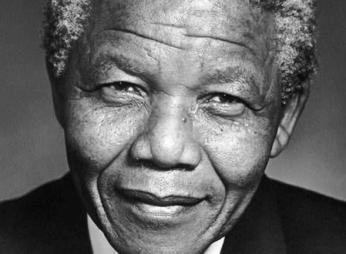Nelson Mandela was many things to many people. Husband, father, political prisoner for 27 years, and finally president of South Africa, a country he worked for and inspired change from within.
South Africans called him Madiba. The name derives from a chief who ruled in 18th century. It is a sign of reverence and respect; respect, in this case, befitting a man who inspired peace activism unlike anyone we have seen since Mahatma Gandhi and Martin Luther King, Jr.

Perhaps, above all, Mandela became a role model not only for generations of South Africans but the international community. After 27 years of prison, he pushed aside anger and bitterness to demonstrate forgiveness for his enemies. “If you want to make peace with your enemy,” he once said, “you have to work with your enemy. Then he becomes your partner.”
Indeed, Mandela spent much of his prison time negotiating with South African President F.W. deKlerk to abolish apartheid and ultimately established multiracial elections. “A good leader can engage in a debate frankly and thoroughly,” Mandela said, “knowing that at the end he and the other side must be closer, and thus emerge stronger. You don’t have that idea when you are arrogant, superficial, and uninformed.”
For their joint work, both men were honored with the 1993 Nobel Prize for Peace.
In this current cycle of cynicism, some may wonder if we will ever see the same kind of selfless spirit. In fact, we see them all the time, in small ways that make a difference for so many around the world.
Each year, cable news network CNN honors ten individualswhom they call “Everyday people who change the world.”
Dale Beatty who, after recovering from losing both his legs to a land mine in northern Iraq, built a modified home for himself with the help of friends. “In 2008,” CNN writes, “[other vets] pooled their military disability payments and started Purple Heart Homes, a nonprofit that so far has modified or helped provide homes for 30 disabled veterans in several East Coast states.”
For Tawanda Jones, living with the violence in Camden, New Jersey can feel like a war zone. So, “Jones started a dance team, the Camden Sophisticated Sisters Drill Team, to entice young girls to stay off the street and do something positive with their lives. Over the years, she has incorporated boys into the team and also started a drum line program.”
Estella Pyfrom worked as a Palm Beach County guidance counselor for five years. After noticing that fewer students had access to a computer after school, she decided to buy a bus, fill it with computers and bring the technology to the kids. “Estella’s Brilliant Bus has provided free, computer-based tutoring for thousands of students since 2011.”
In San Diego, California, Richard Nares, “who lost his son, Emilio, to cancer, started a program called Ride With Emilio to provide transportation for low-income families and their children battling cancer.”
After watching his father and so many of his countrymen suffer due to a lack of doctors in the central African country of Cameroon, Georges Bwelle “…became a doctor himself, working as a vascular surgeon in Yaounde’s Central Hospital. And he started a nonprofit, ASCOVIME, that travels into rural areas on weekends to provide free medical care. Since 2008, he and his group of volunteers have helped nearly 32,000 people.”
One Simple Wish was started by Danielle Gletow to help grant the wishes of children in foster care. Each child’s wish is posted online, and anyone can pay to make that wish come true – from tangible items such as a bicycle, a varsity jacket or school supplies to an experience like music lessons or a trip to the theater. Since 2008, the nonprofit has granted more than 6,500 wishes for children living in 42 states.”
“In the past 15 years, Chad Pregracke has helped pull more than 67,000 tires from the Mississippi River and other waterways across the United States. He’s also helped retrieve 218 washing machines, 19 tractors, 12 hot tubs, four pianos and almost 1,000 refrigerators. To date, about 70,000 volunteers have joined his crusade, helping him collect more than 7 million pounds of debris through his nonprofit, Living Lands & Waters.”
On a research trip to Nigeria, Africa, Dr. Laura Stachelrecognized the need for low-cost electrical lighting for saving birthing mothers and their babies. With the help of her husband and a solar energy expert, she developed a “solar suitcase” that could supply 20 hours of electrical light, as well as a fetal Doppler to monitor a baby’s heart rate.
In 2009, Kakenya Ntaiya opened the first primary school for girls in her Kenyan village, the Kakenya Center for Excellence. Today, Ntaiya is helping more than 150 girls receive the education and opportunities that she had to sacrifice so much to attain.
In Charlotte, North Carolina, Robin Emmons nonprofit, Sow Much Good, has 200 volunteers helping her tend 9 acres of fresh fruit and vegetables for underserved communities in her community. “Emmons and her volunteers distribute recipe cards,” CNN says, “and urge customers to attend the group’s free cooking demonstrations and canning classes. It’s all part of their mission to help people take control over what they are eating and improve their health.”
“It always seems impossible until it’s done,” Mandela said, and these men and women from around the world demonstrate the same passion and commitment for unity, peace and progress as the man who helped change South Africa forever.
Comments










